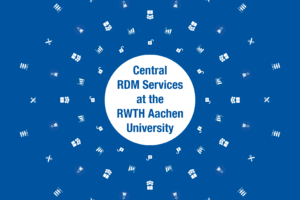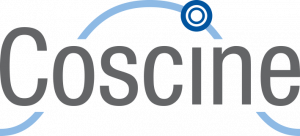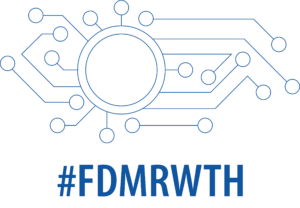This article is part of our series “Central RDM Services at RWTH Aachen“. It is intended to show our researchers – i.e. you – which RDM services are offered at RWTH Aachen University to support you in your research and data management. We talk to the people responsible for the services and collect all the information for you in the individual articles. In this article, we would like to introduce you to the RDM service “Coscine”.
Important Facts
- Official Name of the Service: Coscine
- Link to the Homepage of the Service: https://about.coscine.de/en/
- Target Group: Researchers
- Type: RDM platform
- Available in regular operation at RWTH Aachen University since April 2023
Example of a Coscine Usage Scenario
A researcher at RWTH plans a series of experiments and would like to store the measurement results and analyses with the associated metadata in a secure location and share them with other collaboration partners. He or she uses the RDM platform Coscine for this purpose: files can be stored there, other researchers can be added to the respective project and research data can be archived in Coscine for up to ten years after the end of the project.
What Does Coscine Do?
Coscine offers researchers the opportunity to store research data in accordance with the FAIR criteria. This means that the data, including the associated metadata – such as author, measurement instrument settings, date of collection and so on – are stored within so-called resources. Persistent identifiers (PIDs) are used to ensure the long-term referencing of resources and the data they contain. In Coscine, so-called handle PIDs are automatically assigned at both project and resource level.
Collaboration between researchers, both within their own research group and beyond, is facilitated by the various registration options (ORCiD and DFN-AAI). In addition, Coscine has a simple role structure of “Owner”, “Member” and “Guest”, so that it is possible to regulate who can read and/or edit which files within a project.
In accordance with good scientific practice, it is also ensured that the data in Coscine can be archived for ten years after the end of the project in order to increase reusability.
Who Is Entitled to Use Coscine?
In order to receive free storage space in Coscine, you must either belong to a university that uses the so-called Research Data Storage (RDS) or cooperate with one. The following institutions are eligible for storage space on the RDS: RWTH Aachen, FH Aachen, University of Duisburg-Essen, TU Dortmund, HAWs and FHs in NRW, members of the NFDI.
Coscine can be used by all researchers by logging in via ORCiD. The LinkedData and GitLab resource types are also available to all researchers. In order to receive free storage space, you must be a member of an RDS-authorized university or, in future, a DH.NRW university. Further information on storage space management can be found in the Coscine documentation.
Where Is the Data Stored, How Is It Backed Up and How Long Can the Service Be Used?
Coscine has been developed as an open-source platform since 2018 and has been in regular operation at RWTH Aachen University since April 2023. As part of the Coscine.nrw project, the RDM platform will gradually be made available to all DH.NRW universities and universities of applied sciences as a permanent service. The data is stored as part of the Datastorage.nrw project, in which a total of 15 petabytes of storage space is available to all DH.NRW universities and universities of applied sciences. In order to prevent data loss as far as possible, this storage space is physically distributed across four locations – Aachen, Duisburg-Essen, Cologne and Paderborn.
Context to the Bigger Picture: What Purpose Does Coscine Serve in Modern Scientific Practice?
What Function Does Coscine Have in Modern Knowledge Management?
In modern scientific practice, Coscine enables researchers to store research data and the associated metadata easily and securely. By complying with the FAIR criteria, such as low-threshold registration, unique identification via PIDs, the global search function, etc., the RDM platform offers many advantages in everyday research. The collaboration of national and international research groups is supported in Coscine, as is the archiving of data for ten years after the end of the project.
Further Information
The RDM platform Coscine is an open source platform and thrives on the participation of the community. We are always delighted when researchers report on how Coscine supports them in their daily work and can thus inspire other researchers. You are welcome to contribute to the Coscine community features.
If you have any questions, please contact our servicedesk with the subject “Coscine”: We will be happy to help you.
All Important Pages at a Glance
- Website
- FAQ
- Documentation
- Coscine Newsletter
- Community Features
- Presentation slides on Coscine
- Explanatory video
The information was kindly provided by the deputy service manager of Coscine, Katja Jansen.







Leave a Reply
You must be logged in to post a comment.